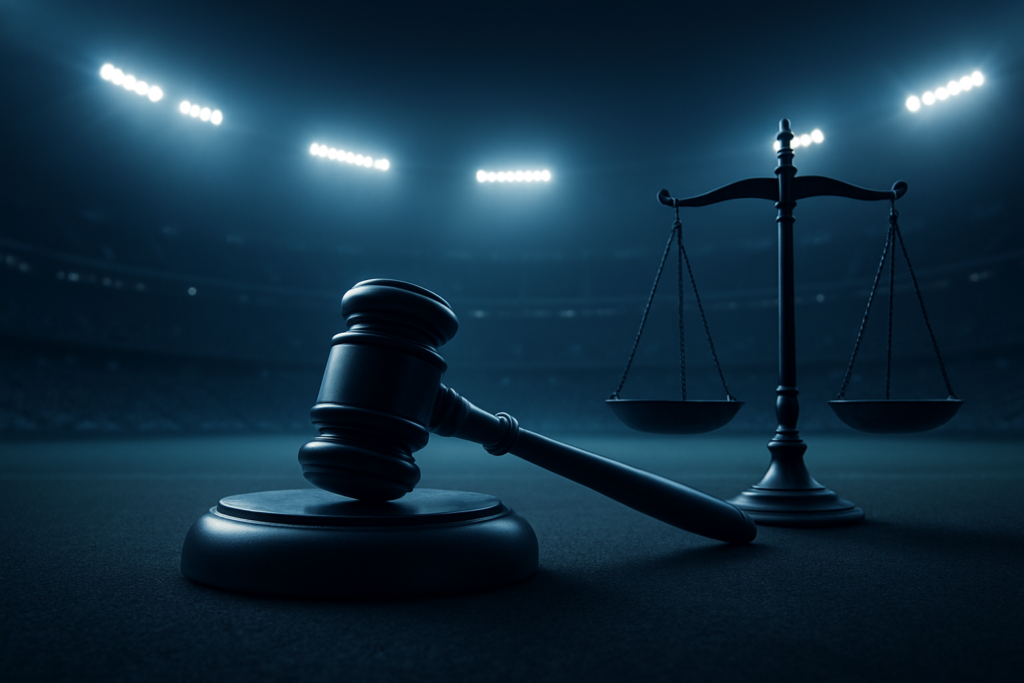This is not legal advice, but general information.
Introduction
The House Settlement brought sweeping changes to college sports. Some of those changes are easy to spot, like backpay for former athletes and new roster limits for current ones. Others are less obvious but just as important. Chief among them are two new mechanisms that work hand in hand to facilitate consistent NIL compliance across all athletes: (1) NIL Go, the oversight platform for NIL deals, and (2) the arbitration appeal process that gives athletes a way to challenge denials. Together, these aim to preserve athletes’ rights to earn money from their name, image, and likeness while putting guardrails in place to prevent “pay-for-play,” which the is still broadly prohibited under the settlement.
What is NIL Go and who is running the platform?
1. The Basics
NIL Go is the central compliance platform created under the House Settlement to regulate NIL activity. The system is operated jointly by the newly formed College Sports Commission, which provides general oversight, and Deloitte US, which performs the day-to-day evaluations of deals. Together, they ensure that NIL agreements follow the settlement’s rules and that student athletes’ rights to earn money remain intact.
Here’s how it works: Any NIL deal worth $600 or more must be submitted through NIL Go before money changes hands. Athletes, schools, and businesses all share responsibility in this process. Athletes are required to provide complete and truthful information; schools must confirm that their athletes use the platform; and Deloitte reviews the terms to confirm compliance.
Think of NIL Go as a compliance checkpoint. Before an agreement moves forward, it needs to be reviewed to confirm that it serves a real business purpose, involves a legitimate third-party payor, and falls within fair market value. Only after this review can the deal proceed.
2. Why NIL Go exists
The logic behind NIL Go is straightforward. NIL exploded so quickly after 2021 that some deals raised eyebrows. Was an athlete really being paid for legitimate promotional work, or was the money just a disguised recruiting inducement? To address those concerns, NIL Go evaluates each deal through a set of questions before determining whether it can move forward:
- Is there a valid business purpose? In other words, is the athlete being paid for something real like endorsing a product, creating content, or appearing at events, or is the deal just a thinly veiled payment for going to a certain school?
- Is the payor truly a third party? NIL money is supposed to come from outside businesses, not directly from schools or boosters. NIL Go looks at whether the entity paying the athlete is independent of the school.
- Is the compensation fair? Deloitte compares the deal to certain benchmarks. They look at an athlete’s market value, social media reach, performance, and similar deals in the marketplace. If the compensation is wildly above comparable ranges, the deal can be flagged. (This is the part where my prior article on student athlete valuation comes into play. Knowing how your value is measured can be critical when NIL Go is setting the guardrails.)
3. Potential Review Outcomes.
After a deal is submitted to NIL Go, one of three determinations will be issued:
- Cleared – The agreement satisfies compliance standards and may proceed without further intervention.
- Not Cleared – The agreement is denied (likely because it lacks a legitimate business purpose, is too closely connected to a school, or departs significantly from fair market value).
- Flagged for Additional Review – The agreement raises questions that require further documentation, revisions, or clarification before a decision can be made.
For athletes and businesses, a flagged determination can feel like a setback, but it’s not a rejection. It simply signals that more information is needed to demonstrate compliance.
What happens if my NIL deal gets denied?
Denials happen, and they can happen for reasons that aren’t immediately clear at first glance. Maybe the business paying the student athlete is loosely connected to a booster. Maybe the compensation looks out of proportion compared to benchmarks. Or maybe the paperwork wasn’t detailed enough to prove a valid business purpose.
The good news is that the House Settlement provides student athletes with a right to appeal through arbitration as detailed below.
Arbitration in the NIL context.
1. What is arbitration?
Arbitration is a form of private dispute resolution where the parties present their case to a neutral decision-maker, known as an arbitrator, rather than going through a public court system. The arbitrator functions much like a judge, reviewing evidence, hearing arguments, and ultimately issuing a binding decision, but without all the courthouse formalities.
This process is not new to sports. Professional leagues such as the NBA, NFL, and MLB have long used arbitration to resolve disputes over contracts, discipline, and eligibility. International competitions, including the Olympics, also rely on arbitration panels to decide urgent matters quickly and confidentially. The House Settlement extends that same model to the NIL context, ensuring that disagreements over compliance, deal approval, or denials are handled efficiently by an arbitrator with relevant expertise rather than left to drag on in a lengthy and costly battle in court.
By incorporating arbitration directly into the NIL system, the House Settlement provides athletes and businesses a reliable path to challenge NIL Go determinations while keeping the process faster, less costly, and more specialized than traditional litigation.
2. What makes arbitration so attractive?
- Speed: Arbitration is much faster than court. Disputes that could drag on for months or even years in litigation can often be resolved in weeks.
- Cost Efficiency: From attorney’s fees to procedural expenses, the arbitration process is generally cheaper than a full lawsuit.
- Privacy: Arbitration proceedings are not public, which protects both athletes and businesses from unwanted headlines.
- Expertise: Arbitrators in this space are often experienced in contract and/or sports law and will likely develop specialized expertise in NIL matters over time. This increases the chances of a fair, informed decision.
(Organizations like the American Arbitration Association (AAA) are already offering streamlined NIL dispute frameworks, with rules designed to handle issues like eligibility and deal compliance quickly and fairly.)
3. Practical steps when deciding to appeal.
If NIL Go denies your deal, here’s a structured way to respond:
Step 1 – Protect Yourself in Advance
When negotiating with a company, consider requesting a Letter of Intent (LOI) that includes binding language about covering arbitration costs and attorneys’ fees if the deal is challenged. While there’s no guarantee a company will agree to the terms, it’s worth the ask since it can ensure a student athlete has the resources to go the distance to preserve the deal.
Step 2 – Notify Your School
Under the House Settlement, schools are allowed to pay for student athletes’ arbitration expenses. That means you have the right to ask your school to cover the cost. Some schools will be more supportive than others, but it’s worth initiating the conversation.
Step 3 – Collect Documentation
Save everything. Emails, text messages, social media posts, draft agreements, and financial terms all hold the potential to help or hurt at arbitration in showing that the deal has a real business purpose and fits within reasonable compensation ranges.
Step 4 – Consult with Counsel
Even though arbitration is simpler than court, the stakes are still real. As such, working with an attorney experienced in NIL arbitration can be a real advantage. The right counsel will be able to frame arguments effectively, identify the evidence that matters most, and guide you through the procedural steps with confidence. For many athletes, a short consultation is enough to clarify whether you should proceed alone or with representation.
Step 5 – File the Appeal
Many student athletes hesitate at this stage, but the system is structured to protect them. If an NIL deal is denied and the athlete elects neutral arbitration, the institution may choose to cover the athlete’s attorney fees and arbitration costs. If the institution agrees to cover these expenses, it must also pay the arbitrator’s reasonable fees and expenses. While coverage is not automatic, athletes can still pursue an appeal without financial risk, as the arbitration process itself does not impose direct costs on the athlete unless he or she chooses to hire counsel without institution coverage. With nothing to lose and everything potentially to gain, filing an appeal is often a smart and low-stakes strategy.
Bringing it all together.
NIL is no longer the free-for-all it once was in the early days. With NIL Go in place, oversight is here to stay. That doesn’t mean NIL is shutting down. In fact, this might create a better NIL space by ensuring that both student athletes and businesses are more intentional and strategic in their approach to NIL deal structuring.
Whether you’re a student athlete or company engaging in NIL ventures, understanding the NIL Go reporting process gives you a competitive edge. For student athletes, you’ll be able to identify what kinds of deals are most likely to clear, how to prepare for arbitration if needed, and how to take steps to protect yourself financially. If you’re a business, it can mean structuring your NIL contracts carefully so they pass review the first time.
For questions about your specific situation, consulting an attorney familiar with NIL compliance and arbitration is the best way to make informed decisions.
This is not legal advice, but general information.


